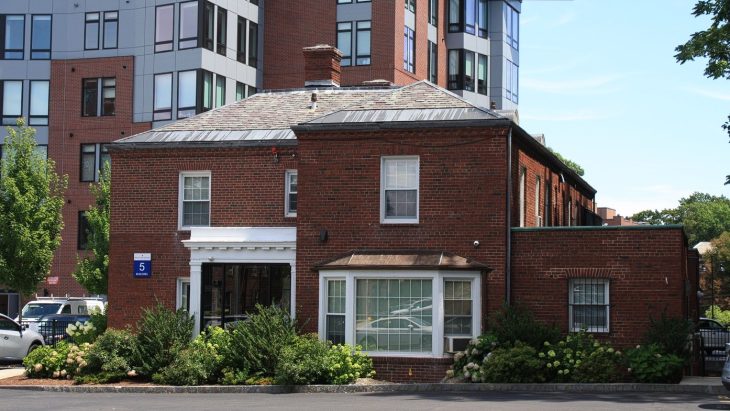Addiction Treatment Center of New England in Brighton

About Addiction Treatment Center of New England in Brighton
Based in Brighton, Massachusetts, Addiction Treatment Center of New England provides accredited care to adult clients including pregnant and postpartum individuals. It also proudly identifies as an LGBTQ+ friendly facility. As for payment, various insurance plans are accepted, including MassHealth (Standard, CarePlus, CommonHealth), Medicare Part B, and more. Sliding scale fees are also available to eligible individuals.
Medication Assisted Treatment (MAT) For Substance Abuse
Various MAT methods are used here including a methadone maintenance program designed to provide long-term care to individuals with a history of addiction. This option includes random drug testing, daily dosing, along with weekly counseling sessions to allow participants to time and space to unpack their behavioral patterns with professional support.
The center also provides a 180-day, or six-month methadone detox program for individuals who are ready to come off methadone altogether and sober up completely. This program involves an initial stabilization period, followed by an incremental, medically supervised detox phase.
Other medications used here to support clients’ recovery journeys include buprenorphine (Subutex) which is available through daily dosages and paired with weekly counseling and random drug testing. Meanwhile, naltrexone (Vivitrol) is dosed monthly as an extended release medication that blocks the effects of opioids. Naltrexone treatment is also paired with weekly counseling.
Behavioral Health and Transitional Assistance Services
Telehealth counseling is also available here as a remote and accessible behavioral treatment option. Former clients can also access continued counseling services for up to 6 months following the completion of a medication assisted treatment program as aftercare support.
Transitional assistance to treatment (TAT) is another of the center’s initiatives, providing recovery coaching via partnerships with organizations like BMC’s Faster Paths to Treatment.
| Levels of Care | Detox Service Setting | Programs | Payment Options | |||
|---|---|---|---|---|---|---|
|
In outpatient therapy, you’ll attend therapy sessions several times each week while living at home. This is ideal if you have a strong support system and a lower risk of relapse. Outpatient treatment offers flexibility to maintain work, school or family obligations. |
||||||
|
Outpatient detox gives you access to medically supervised withdrawal services while still allowing you to live at home. You’ll attend a clinic for treatment and monitoring. This flexible option is suitable for those with mild to moderate withdrawal symptoms who have strong support systems. |
||||||
|
Adult programs address the substance use and life challenges specific to adults. Therapists can deliver sessions in individual, group and family settings. Services often include job support and life skills training in a structured environment. |
Alcohol detox programs offer medical support to help individuals withdraw safely from alcohol. Your care team may use medications to ease your symptoms and provide medical monitoring to address complications. |
Drug detox programs support individuals who are withdrawing from addictive substances like cocaine and heroin. Medical support helps you manage symptoms in a controlled and safe environment so you can achieve initial sobriety. |
Men's programs address substance use while also considering the social pressures, family roles and mental health concerns that are specific to men. You’ll learn healthy coping mechanisms as you build emotional resilience and develop communication skills. |
Opioid detox uses medications to ease severe withdrawal symptoms. It also includes medical supervision to help you manage potential complications. These services allow you to stabilize and begin a recovery plan. |
Women's programs offer a safe and supportive space to focus on gender specific issues such as trauma, family roles and mental health conditions. Therapists tailor the sessions to address women's needs and foster empowerment in a healing and nurturing environment. |
Young adult programs are designed for individuals who are transitioning into adulthood. Topics of discussion typically include identity, independence and peer relationships. Providers may also offer life skills training and career support. |
|
Payment Assistance
|
Medicaid
|
Self Pay
|
Levels of Care
In outpatient therapy, you’ll attend therapy sessions several times each week while living at home. This is ideal if you have a strong support system and a lower risk of relapse. Outpatient treatment offers flexibility to maintain work, school or family obligations.
Detox Service Setting
Outpatient detox gives you access to medically supervised withdrawal services while still allowing you to live at home. You’ll attend a clinic for treatment and monitoring. This flexible option is suitable for those with mild to moderate withdrawal symptoms who have strong support systems.
Programs
Adult programs address the substance use and life challenges specific to adults. Therapists can deliver sessions in individual, group and family settings. Services often include job support and life skills training in a structured environment.
Alcohol detox programs offer medical support to help individuals withdraw safely from alcohol. Your care team may use medications to ease your symptoms and provide medical monitoring to address complications.
Drug detox programs support individuals who are withdrawing from addictive substances like cocaine and heroin. Medical support helps you manage symptoms in a controlled and safe environment so you can achieve initial sobriety.
Men's programs address substance use while also considering the social pressures, family roles and mental health concerns that are specific to men. You’ll learn healthy coping mechanisms as you build emotional resilience and develop communication skills.
Opioid detox uses medications to ease severe withdrawal symptoms. It also includes medical supervision to help you manage potential complications. These services allow you to stabilize and begin a recovery plan.
Women's programs offer a safe and supportive space to focus on gender specific issues such as trauma, family roles and mental health conditions. Therapists tailor the sessions to address women's needs and foster empowerment in a healing and nurturing environment.
Young adult programs are designed for individuals who are transitioning into adulthood. Topics of discussion typically include identity, independence and peer relationships. Providers may also offer life skills training and career support.




